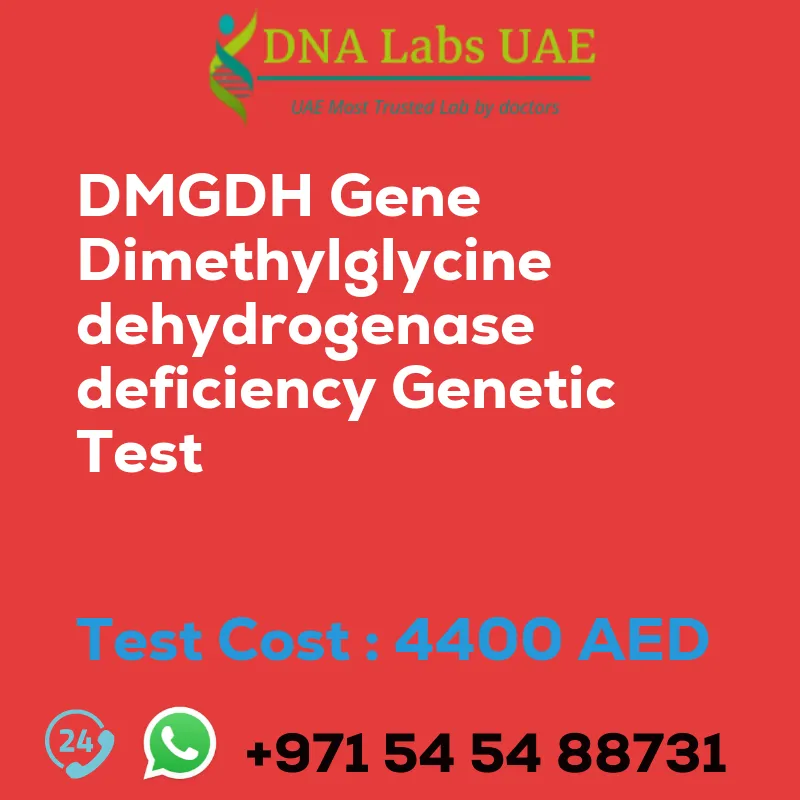DMGDH Gene Dimethylglycine dehydrogenase deficiency Genetic Test
Components: DMGDH gene
Price: 4400.0 AED
Sample Condition: Blood or Extracted DNA or One drop Blood on FTA Card
Report Delivery: 3 to 4 Weeks
Method: NGS Technology
Test Type: Metabolic Disorders
Doctor: General Physician
Test Department: Genetics
Pre Test Information: Clinical History of Patient who is going for DMGDH Gene Dimethylglycine dehydrogenase deficiency NGS Genetic DNA Test. A Genetic Counselling session to draw a pedigree chart of family members affected with Dimethylglycine dehydrogenase deficiency.
Test Details:
DMGDH gene, also known as dimethylglycine dehydrogenase gene, is responsible for the production of the enzyme dimethylglycine dehydrogenase. This enzyme plays a crucial role in the metabolism of dimethylglycine (DMG), an amino acid derivative found in the body.
A deficiency in DMGDH gene leads to a condition called dimethylglycine dehydrogenase deficiency (DMGDH deficiency). This is a rare autosomal recessive disorder characterized by the impaired breakdown of DMG, resulting in the accumulation of DMG in the body.
NGS genetic testing, also known as next-generation sequencing, is a high-throughput DNA sequencing technology that allows the simultaneous sequencing of multiple genes or even the entire genome. In the context of DMGDH deficiency, NGS genetic testing can be used to identify mutations or variations in the DMGDH gene that may be responsible for the disorder.
By analyzing the DNA sequence of the DMGDH gene, NGS genetic testing can provide valuable information about the presence of any mutations or variations that may be causing DMGDH deficiency. This information can help in confirming a diagnosis, predicting the severity of the condition, and guiding appropriate treatment and management strategies.
It is important to note that NGS genetic testing for DMGDH deficiency is typically performed in specialized genetic testing laboratories and should be ordered and interpreted by healthcare professionals with expertise in genetics. The results of the genetic test should be interpreted in the context of the individual’s clinical presentation and family history to provide accurate diagnosis and appropriate management.
| Test Name | DMGDH Gene Dimethylglycine dehydrogenase deficiency Genetic Test |
|---|---|
| Components | |
| Price | 4400.0 AED |
| Sample Condition | Blood or Extracted DNA or One drop Blood on FTA Card |
| Report Delivery | 3 to 4 Weeks |
| Method | NGS Technology |
| Test type | Metabolic Disorders |
| Doctor | General Physician |
| Test Department: | Genetics |
| Pre Test Information | Clinical History of Patient who is going for DMGDH Gene Dimethylglycine dehydrogenase deficiency NGS Genetic DNA Test A Genetic Counselling session to draw a pedigree chart of family members affected with Dimethylglycine dehydrogenase deficiency |
| Test Details |
DMGDH gene, also known as dimethylglycine dehydrogenase gene, is responsible for the production of the enzyme dimethylglycine dehydrogenase. This enzyme plays a crucial role in the metabolism of dimethylglycine (DMG), an amino acid derivative found in the body. A deficiency in DMGDH gene leads to a condition called dimethylglycine dehydrogenase deficiency (DMGDH deficiency). This is a rare autosomal recessive disorder characterized by the impaired breakdown of DMG, resulting in the accumulation of DMG in the body. NGS genetic testing, also known as next-generation sequencing, is a high-throughput DNA sequencing technology that allows the simultaneous sequencing of multiple genes or even the entire genome. In the context of DMGDH deficiency, NGS genetic testing can be used to identify mutations or variations in the DMGDH gene that may be responsible for the disorder. By analyzing the DNA sequence of the DMGDH gene, NGS genetic testing can provide valuable information about the presence of any mutations or variations that may be causing DMGDH deficiency. This information can help in confirming a diagnosis, predicting the severity of the condition, and guiding appropriate treatment and management strategies. It is important to note that NGS genetic testing for DMGDH deficiency is typically performed in specialized genetic testing laboratories and should be ordered and interpreted by healthcare professionals with expertise in genetics. The results of the genetic test should be interpreted in the context of the individual’s clinical presentation and family history to provide accurate diagnosis and appropriate management. |








